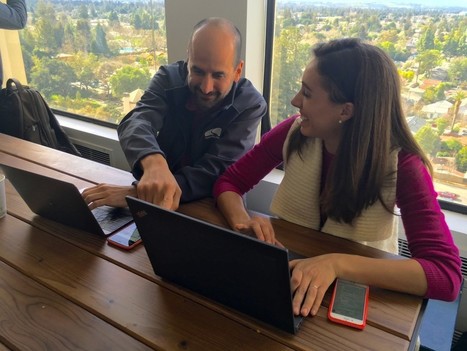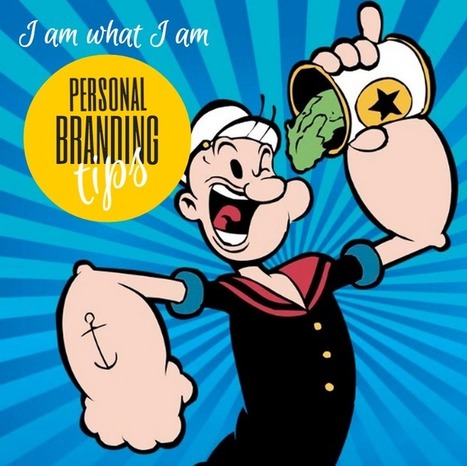 Your new post is loading...
 Your new post is loading...
The number one takeaway of the VC Unlocked investor training program was that there are lots of different paths to becoming a successful investor – and no one way is best. This was great news for the diverse group of participants, who came to Silicon Valley from all over the world for an intensive two week course run by 500 Startups in partnership with Stanford Center for Professional Development. The program, Venture Capital Unlocked: Secrets of Silicon Valley Investing, ran from Feb 8 – 19th, 2016. On the last day of the program, participants reflected on the question, “Did we really unlock the secrets to venture capital?” The answer was a resounding yes. Read more: click image or title. FREE Business Plan Template here: http://bit.ly/1aKy7km
Via Arnaud Bonzom, Samuel Pavin, Marc Kneepkens
The best startup founders may need patience, resilience, perspective, and zen to run their businesses. But they also need some less flattering characteristics they may not want to admit to. It’s 2015. Have you founded your startup yet? If not, it may be time to join the club. With 50 technology startups launching each day in Beijing alone, it’s clear that it’s past time to jump on the bandwagon. Accelerators, incubators, and VC funds splash around so much cash that it’s no longer worth counting the number of tech startups with million-dollar valuations. Indeed, as of this writing, 100 unicorns have received billion-dollar valuations. With all that capital floating around, you might be feeling confident about that bulletproof idea you had. You know, the one for an app that irons your dress shirts for you? You can name-check your all-star forefathers — Jobs, Musk, Armstrong — and you’ve flipped through Art Of The Start. You’re ready. Right? Wrong. There’s a reason 90 percent of startups fail. So before you start mapping The Iron Fist’s path from beta to billions, let’s take a step back. Having spent nearly 20 years working for a variety of startup founders, interacting with many more in the community, and serving as one myself, I’m constantly disappointed with a lot of the startup founder advice out there. Of course, any successful founder needs to be a savvy leader, an able communicator, a nimble problem solver, and a really really smart person. To run any business, you need patience, resilience, perspective, zen — the list goes on. But what about the less obvious — and to some, less flattering — traits that make up the remainder of the startup founder DNA? Startup founders tend to be culled from the outliers, the obsessives, the oddballs. Those who find success manage to take what would otherwise be a shortcoming — the inability to sit still, workaholism, pigheadedness — and with a strong vision, mold it into something constructive. Let’s take a look at five of the least-touted traits found in some of the best-performing startup founders. Read more: click image or title.
Need funding? Get your Free Business Plan Template here: http://bit.l/1aKy7km
Via Marc Kneepkens
Startup Directories: The Good, The Bad, and The Ugly
In order to increase your odds for receiving funding, here are some criteria considered by venture capitalists. It's easy to dislike angel and venture capitalist investors. For entrepreneurs looking to raise capital for their start-up businesses, these early-stage investors can be awfully hard to find, and when you do find them, it's even tougher to get investment dollars out of them.
But, think again: angels and venture capitalists (VCs) are taking on serious risk. New ventures frequently have little or no sales; the founders may have only the faintest real-life management experience, and the business plan may be based on nothing more than a concept or a simple prototype. There are good reasons why VCs are tight with their investment dollars. To read the full article, click on the title.
Get your Free Business Plan Template here: http://bit.ly/1aKy7km
Via Marc Kneepkens
|
Medium's Read Time App and Scoop.it's Lean Content
This Curagami post shares KUDOS for Guillaume Decugis and the @scoopit team. Medium's making their read time app, somethg they call Readism, available across the web is sure to hasten every prediction Guilluame and company made about lean content marketing several years ago.
Medium's new "app" is a Chrome extension. If you are creating content and NOT using it you're nuts. We decided to make two posts instead of one when we saw six minute read time on our lean content + tools riff.
We wanted to add a few tools to Scoop.it's Why Lean Content Is The Future of Content Marketingpost. We wanted to add:
- Haiku Deck (like more than Slideshare)
- Feedly Pro (so you have a site)
But their side did say "many more", so we will save our 1,000 word six minute read content curation tools post for tomorrow. In the meantime, if you're not using Medium's read time app Readism and you use content to market online you're nuts.
http://www.curagami.com/lean-content-marketing-medium-cool/
Via Martin (Marty) Smith
How many times have you heard startups are hard and companies fail? You know the drill. Think about it: If angel investors were actually buying your company, they would be much more interested in its outcome. But they aren’t. Sure, angel investors are taking a small option to buy future shares at a discount price--particularly since the vast majority of funding rounds nowadays are made through a convertible note--but in their eyes that’s just a byproduct; a consequence. From an angel investor standpoint, you’re now competing with hundreds--if not thousands--of other startups. Every single one of them are valued between $3 million and $6 million--and in more rare cases, up to $8 million. Every. Single. One. Let that sink in for a second. It’s like when you go to the supermarket, and you are surrounded by 20 different brands of cornflakes all priced the same. How do you decide which one to buy? The angel investor is viewing you and your startup as that brand of cornflakes on the shelf. So how do they make a decision? They take the following four things into account: - Product
- Team
- Market
- Traction
Angel investors ask themselves the following questions while talking to you about your startup: - Do I like the team?
- Am I comfortable with the market?
- Does your startup have meaningful traction compared with the other cornflakes beside them?
If you want to maximize your chances of finalizing a positive outcome--or in other words, having them write you a big fat check--you better have a good answer to all those questions. Any angel investor doing their homework can reach any startup through AngelList, and can also collect third-party data on you and your competitor via tools like Mattermark. Startup Success Is Unpredictable So this is how they make their purchase decision, but what are they actually buying from you? Not your company . . . but rather access to privileged information. Think about it for a second--that’s why investors don’t care if you fail, but get pissed off if you don’t share what’s happening. It’s fine to screw up, but it’s not okay to hide it. Does this ring a bell? Here’s why. Regardless of what the average investor may tell you, the reality is no one can predict who or what will become successful. Companies pivot. Markets shift. Founders split up. In short: shit happens. When the most exciting companies start fundraising, they usually become oversubscribed very fast. Look at three startups everybody knows: Uber, Airbnb, and Color. Uber started with an AngelList round at $5 million, and now is the hottest company on the planet. Color started off as the hottest company on the planet and vanished, regardless of a monster round. Meanwhile, Airbnb originally offered cereal and air mattresses before nailing down the model that made them worth more than the Hyatt--without owning a single room or hotel. Another element to understand is timing. When the most exciting companies start fundraising, they usually become oversubscribed very fast. Some other companies fundraise for a long time and collect interest until they find a lead on which everybody wants to pile on, but at that point it’s the company that decides who’s in and who’s out. The actual window for investors to act upon is pretty small, and when it does open they’re forced to make a decision very quickly. If they don’t know you beforehand, then it’s very unlikely they will have the time to collect all the data they’d like. Don't Hide Screwups; Be Upfront Even if investors have known you and your startup for a while, they still have an issue--it’s very hard to see how a company is performing from the outside. A majority of founders don’t disclose monthly key metrics and their performance in time--if not from a very high-level standpoint. It’s like peering through the keyhole. Sure, they get a glimpse of what’s going on, but they cannot picture the whole story. And that’s a huge issue, because having access to information before others means being able to put more money at lower valuations. That's a win. What’s the best way to get early access to data so you can determine the difference between an Uber and a Color? Being an actual investor. Here's the downside: lots of early bets will fail. But the upside? They’ll get privileged access to information, and they’ll be able to know--instead of guessing--who is really outperforming the other companies they have information on, benchmarking you against the other ones. Why is this important? Well . . . because of math, and because the real action is what happens next.
Put yourself in the shoes of an angel investor who has 20 investments. If you invested at a $5 million average valuation and 15 of them will eventually fail, four of them will exit for an average of $20 million, and one of them will instead make a $250 million exit. That’s a ballpark figure of around a 4X exit in four cases, and a 50X in one case. It’s a 64X return on a 20X investment; not bad at all if you can get it, and should not be taken for granted. Even if investors have known your startup for a while, it’s hard to see how a company is performing from the outside. But here's where things get interesting. If you double down at the following round of a best performing company that has a $25 million valuation, then that's an additional 10X return on a single--and a much less risky--investment. That means you’ll have the opportunity to get a 74X return total on a 21X investment, or a 94X return on a 23X investment . . . which is way more exciting. It’s called pro-rata rights if you’re doing a priced round with preferred shares, but any good founder will give the same opportunity to his early investors anyway, regardless of the financial vehicle used. That’s why angel investors don’t care if you’re screwing things up and failing, as long as you’re upfront enough to share that information with them, enabling them to benchmark the other companies with you. Not only that--they’ll also be more than happy to help. --Armando Biondi is cofounder and COO of AdEspresso, a SaaS solution for Facebook ads optimization. He lived in Italy until relocating to San Francisco in 2012. He previously cofounded Pick1 and four other non-tech companies. He’s also an angel investor in Mattermark and 10 more companies, is proudly part of the 500 Startups network, and is also a former radio speaker.
Via Marc Kneepkens
You. Me. Michael Hyatt. Popeye. Perhaps we don’t have that much in common. Ah, but we do. Personal brands are we. Our agendas may differ—better job, more clients, book sales, or (your goal here)—but we seek the same things: recognition, respect, influence and success. You, my friend, are a brand. Our agendas may differ—better job, more clients, book sales, or (your goal here)—but we seek the same things: recognition, respect, influence and success. Here are five tips from online leader Michael Hyat and 6 more from me. To read the full article, click on the image or title.
Get your Free Business Plan Template here: http://bit.ly/1aKy7km
Via Stefano Principato, massimo facchinetti, Marc Kneepkens
Old real estate and oil money in town invested in San Antonio’s Rackspace early on, said Stephanie Chandler, partner with Jackson-Walker. It was one of the first cases of old San Antonio money backing a startup technology venture here, she said. Now with Geekdom, a technology incubator and accelerator in downtown San Antonio, the goal is to get even more local investment into startups, Chandler said. “Over the last ten years there’s a much more significant uptick in what families are doing,” in investing in startup deals, she said. “Five years ago, we didn’t have the Rackspace founders looking at deals.” To read the full article, click on the title.
Get your Free Business Plan Template here: http://bit.ly/1aKy7km
Via Marc Kneepkens
As more consumers switch to smart phones, emerging channels are gaining importance in a marketing space that SEO has dominated. For years, brands have used SEO strategy to market their products, but it has become harder to find as an increasing number of search results are returning unrelated content.
Also, according to one entrepreneur, in 2013 organic search results made up only 13 percent of screen space. The rest of the screen was dominated by "ads and jun"
Problems with SEO-lead strategy are only magnified as more consumers view content on mobile devices. For instance, vertical and native search on mobile is continually threatening traditional search. Google’s traditional search traffic had declined 3 percent by the end of 2012.
Via Brian Yanish - MarketingHits.com, Martin (Marty) Smith
|



 Your new post is loading...
Your new post is loading...




















